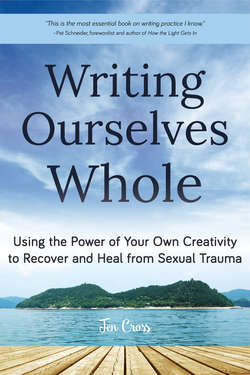Читать книгу Writing Ourselves Whole - Jen Cross - Страница 16
На сайте Литреса книга снята с продажи.
Оглавлениеwhat they take
All over the country, all over the world, illuminated by that insouciant yellow moon, bright, clever, curious children are being suffocated under the weight of the violence done to them. They are turning themselves inward. They are turning away from what they love, because what they love is used against them. They are learning to distrust their curiosity, their intuition. They are learning that there’s no room for wonder—how can you take time to explore the world when so much of your creative genius must go to keeping yourself alive and as safe as possible?
•§•
I imagine what I might have been able to do with the last twenty years of my life if I hadn’t been, first and foremost, focused on surviving.
Yes, I know we are to be grateful for the places we get to, eventually. We are to be grateful that, eventually, we heal enough to find a way back into intimacy, find a way back into joy. We can find a way back into these bodies that have carried us around, even through hell. Eventually we find a way home, into ourselves and our real lives, if we are lucky and persistent and don’t die in the meantime.
Please hear me: this isn’t about self-pity. I just feel sad.
When we say they steal our souls, steal our lives, this is what we mean—they impact what we can do with our capacity, our incipience. They leaked their barrels of crude oil into the complex and nascent pool of us, they poison all of the very many different selves we had before us to possibly become.
And so, instead of having the chance to focus our energies on becoming one of those many selves, we must spend our years cleaning the slough, trying to remove the crude. We bring in big booms to collect and clear out en masse what remains of the spill. We clean off the bigger animals—the ducks and muskrats and deer and raccoons. One by one, we wipe out eyes, wash until most of the residue is gone. We clear away what died, spend years fertilizing, tending the soil, hoping life will return to the places that were decimated. We spread fire-retardant material, we post sentries and guards at the edges of the pond, trying to keep watch on all sides, wanting to keep out anyone who’d try to pollute us so badly again. Sometimes we are successful. Sometimes we are not—but the energy is expended just the same.
Regardless of what else we wanted to study and learn, we have to teach ourselves biologics, become environmentalists, scientists—we learn to develop little organisms that will feed on what’s left of the poison, that will consume what molecules are left in the water and will seek out the bits that fell to the floor of the pond, permeated the water, soaked into the sand, coated the tadpoles and minnows and frogs and turtles, got inside their mouths, ate into the grasses and pond marsh and tilted the ecosystem toward death.
